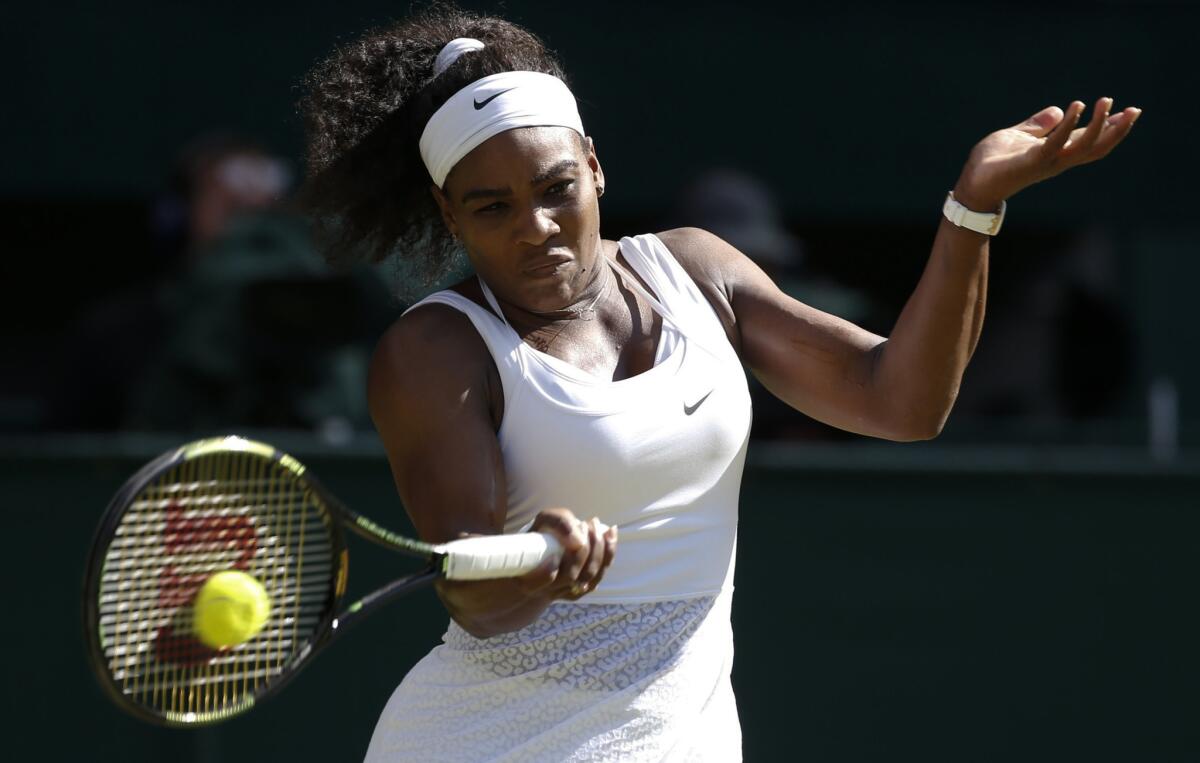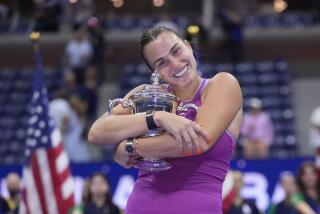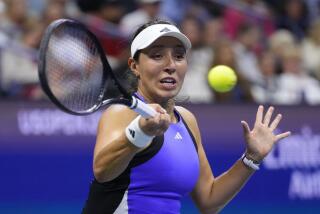Serena Williams defeats Maria Sharapova to advance to Wimbledon final

Serena Williams defeated Maria Sharapova of Russia, 6-2, 6-4, Thursday in a Wimbledon semifinal match. Williams will face Garbine Muguruza of Spain on Saturday in the final.
- Share via
Reporting from London — Once again Thursday, Maria Sharapova was able to draw upon her vast experience in a familiar situation.
She could face the media, force a smile, and do her best to sugar-coat what she has been sugar-coating for the last 11 years.
Forgive her if she had a bit of a deer-in-the-headlights look.
Yes, she had lost to Serena Williams again. Yes, Williams served big and hit big and is a wonderful player and seems to thrive on occasions such as Thursday’s, a Wimbledon semifinal.
“She does always come with her best tennis,” Sharapova said, glancing around like somebody hoping to find a secret exit. “You have to produce your best tennis, and then more.”
You wonder if anybody has kept a record on how many times she has said this. You wonder if, at one time, she actually had to rehearse.
No longer. The post-Serena-match statements are, sadly for Sharapova, second nature by now.
It has been 11 years, and 17 matches, since she was able to talk about a victory over Williams. That was in the women’s tour finals at the end of 2004. A few months earlier, as a 17-year-old prodigy from Russia, she beat Williams in the final of Wimbledon.
A star was born then. She has won four more majors since, and made millions. She remains a star.
But that ’04 season must have stuck with Williams. Or something has. After that WTA final, their rivalry has become the most one-sided sports matchup since Floyd Mayweather against everybody else.
If Sharapova were a baseball team, she’d be the Chicago Cubs. She has been kicked around by Williams like a soccer ball. When you see that they are about to play, the compassionate thing is to find a church and light some candles for her.
In that string of 17 losses, Sharapova only got it to a third set three times, and two of those resulted in final-set losses of 6-0 and 6-1.
Thursday wasn’t much better.
Williams won, 6-2, 6-4. She hit 13 aces and waited for Sharapova’s serve — one of the most predictable implosions on the women’s tour — to implode. Then she cranked enough bullet serves and sizzling ground strokes to finish off the mismatch in 1 hour, 19 minutes. That’s about par for this 11-year pounding.
Before Williams appeared to get interested, Sharapova handed her a break with three double faults in her first service game. Twelve winners and seven aces later, Williams was in the second set and awaiting another gift from Sharapova.
It came at 2-2 of the second. Sharapova double faulted on break point and all Williams had to do was use her explosive serve — which is probably the best in the history of the women’s game — as she always does.
Sharapova actually tried to hand it to her a bit early, double-faulting to match point at 3-5. But when Williams took the service line at 5-4, she performed like a well-programmed computer game.
She hit a 105-mph ace for 15-love, dumped a dopey little second serve at 71 mph into the net for a double fault for 15-all, then hit a 122-mph ace, followed by a 109-mph ace that got her to match point.
To her credit, Sharapova did not go quietly.
Williams yanked a 103-mph serve wide in the deuce court. Sharapova stretched and lunged and was just able to tick the ball with her racket.
Take that, Ms. Williams. If you are going to beat Maria Sharapova 11 years in a row and in 17 straight matches, you are not going to finish it with an ace.
Williams also played her role well, in the forever script-sounding and predictable post-Sharapova-match media routine.
“It is never easy to beat such a great player, who has had such a wonderful career,” she said. “Whenever I know I have to play Maria, I know I have to be focused...”
Saturday, she will focus on a player few expected to be across the net from her in the final.
Garbine Muguruza of Spain, 21 years old and 20th-ranked and seeded, did an exceptional job of staying aggressive against veteran Agnieszka Radwanska of Poland in the other semifinal. Muguruza won, 6-2, 3-6, 6-3, by withstanding the steady ground-stroking and pace-mixing of the former Wimbledon finalist.
Muguruza missed a lot, but never stopped firing. She ended up with 39 winners and 23 unforced errors. She also recognized what she was up against and stayed the course.
“She did good, she fight,” she said of Radwanska. “She won the second set. But I was, ‘OK, stay calm.’”
She also recognized where she is.
“You work all your life to achieve a Grand Slam final, to be in this situation,” Muguruza said. “It’s like a dream.”
Sharapova might use a different word. Maybe “nightmare.”
That would especially be true when Williams recalls former matches, which she did Thursday.
Asked about Muguruza, Williams said, “She actually has a win against me.” That she does, in the second round of last year’s French Open.
There are huge differences.
That was on clay. This will be on grass, with Williams looking for her fourth consecutive Grand Slam tournament title, her 28th consecutive Grand Slam match victory and the possibility of a Calendar Year Grand Slam staying alive for its grand finale at the U.S. Open.
Strange things happen in tennis. Anybody getting to a Wimbledon final should not be sold short. But in this case, the compassionate thing for Muguruza might be to find a church and light some candles for her.
Twitter: @DwyreLATimes
More to Read
Go beyond the scoreboard
Get the latest on L.A.'s teams in the daily Sports Report newsletter.
You may occasionally receive promotional content from the Los Angeles Times.











